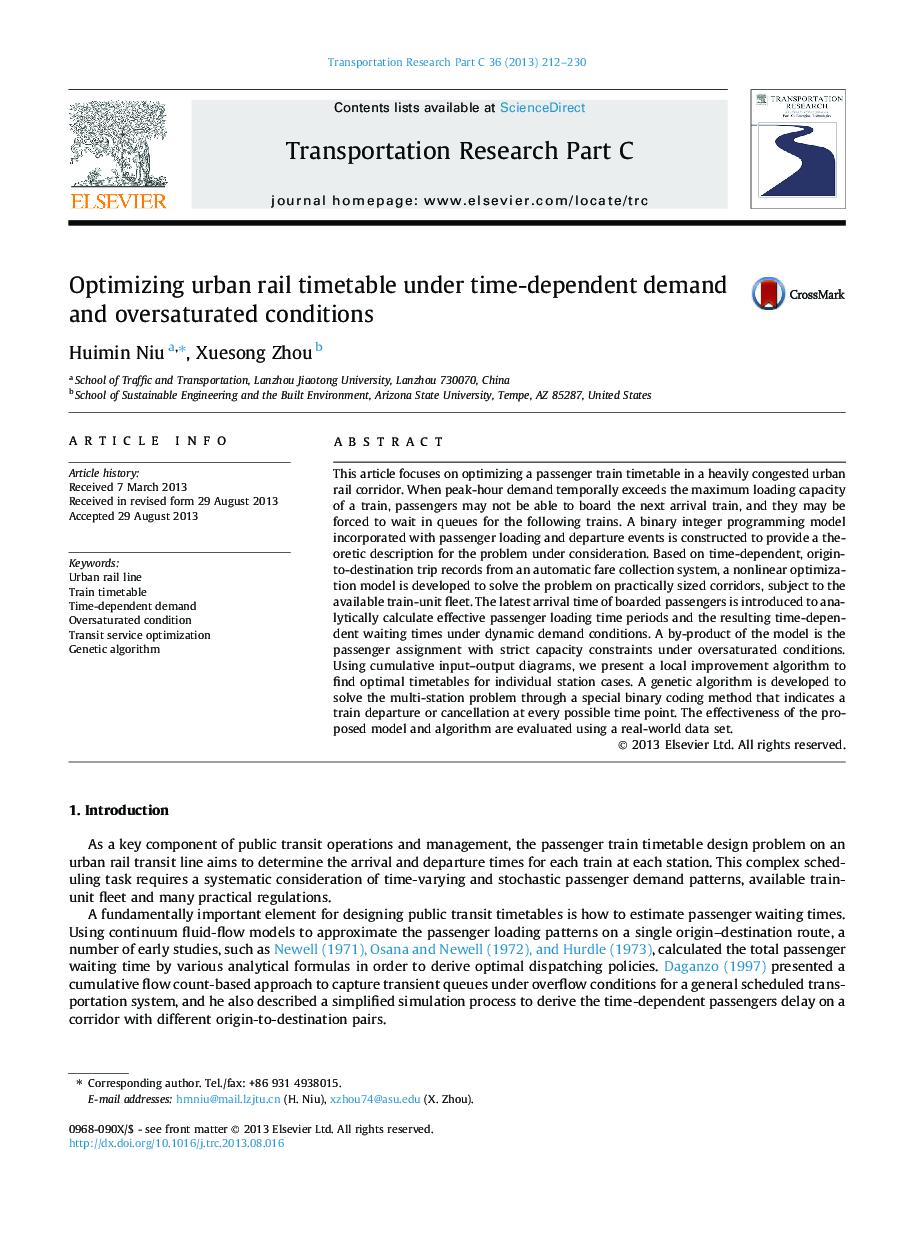| کد مقاله | کد نشریه | سال انتشار | مقاله انگلیسی | نسخه تمام متن |
|---|---|---|---|---|
| 6937265 | 869116 | 2013 | 19 صفحه PDF | دانلود رایگان |
عنوان انگلیسی مقاله ISI
Optimizing urban rail timetable under time-dependent demand and oversaturated conditions
ترجمه فارسی عنوان
بهینه سازی زمانبندی راه آهن شهری در شرایط تقاضای وابسته به زمان و شرایط بیش از حد
دانلود مقاله + سفارش ترجمه
دانلود مقاله ISI انگلیسی
رایگان برای ایرانیان
کلمات کلیدی
خط آهن شهری، جدول زمانی قطار، تقاضای وابسته به زمان، شرایط اضطراری، بهینه سازی خدمات حمل و نقل، الگوریتم ژنتیک،
ترجمه چکیده
این مقاله با هدف بهینه سازی جدول زمانی مسافر مسافر در یک راهروی راه آهن شهری پرقدرت است. هنگامی که تقاضای ساعتی حداکثر ظرفیت حداکثر بارگیری یک قطار، ممکن است مسافرین قادر به پرواز در قطار بعدی نشوند، و ممکن است مجبور شوند در صف برای صف های زیر صبر کنند. یک مدل برنامهنویسی عدد صحیح باینری که همراه با رویدادهای بارگیری و خروج مسافرین ساخته شده است، برای ارائه توضیحی نظری برای مسئله مورد بررسی قرار گرفته است. براساس اسناد سفر وابسته به زمان و مقصد از یک سیستم جمع آوری کرایه اتوماتیک، یک مدل بهینه سازی غیرخطی برای حل مشکل در راهروهای عمودی اندازه، با توجه به ناوگان قطار موجود موجود، توسعه داده شده است. آخرین زمان ورود مسافرین سوار شده به منظور تحلیلی محاسبه دوره های بارگیری موثر مسافر و زمان انتظار مربوط به زمان تحت شرایط تقاضای پویا معرفی شده است. یک محصول جانبی این مدل، تخصیص مسافر با محدودیت های سختی سخت تحت شرایط بیش از حد است. با استفاده از نمودارهای ورودی-خروجی تجمعی، ما یک الگوریتم بهبود محلی برای یافتن جدول زمانی مطلوب برای موارد ایستگاه های مختلف ارائه می دهیم. یک الگوریتم ژنتیک برای حل مسئله چند ایستگاه از طریق یک روش کدگذاری باینری خاص که نشان دهنده خروج یا قطعی قطار در هر نقطه زمانی ممکن است، توسعه یافته است. اثربخشی مدل پیشنهادی و الگوریتم با استفاده از داده های واقعی در دنیای واقعی مورد ارزیابی قرار می گیرد.
موضوعات مرتبط
مهندسی و علوم پایه
مهندسی کامپیوتر
نرم افزارهای علوم کامپیوتر
چکیده انگلیسی
This article focuses on optimizing a passenger train timetable in a heavily congested urban rail corridor. When peak-hour demand temporally exceeds the maximum loading capacity of a train, passengers may not be able to board the next arrival train, and they may be forced to wait in queues for the following trains. A binary integer programming model incorporated with passenger loading and departure events is constructed to provide a theoretic description for the problem under consideration. Based on time-dependent, origin-to-destination trip records from an automatic fare collection system, a nonlinear optimization model is developed to solve the problem on practically sized corridors, subject to the available train-unit fleet. The latest arrival time of boarded passengers is introduced to analytically calculate effective passenger loading time periods and the resulting time-dependent waiting times under dynamic demand conditions. A by-product of the model is the passenger assignment with strict capacity constraints under oversaturated conditions. Using cumulative input-output diagrams, we present a local improvement algorithm to find optimal timetables for individual station cases. A genetic algorithm is developed to solve the multi-station problem through a special binary coding method that indicates a train departure or cancellation at every possible time point. The effectiveness of the proposed model and algorithm are evaluated using a real-world data set.
ناشر
Database: Elsevier - ScienceDirect (ساینس دایرکت)
Journal: Transportation Research Part C: Emerging Technologies - Volume 36, November 2013, Pages 212-230
Journal: Transportation Research Part C: Emerging Technologies - Volume 36, November 2013, Pages 212-230
نویسندگان
Huimin Niu, Xuesong Zhou,
